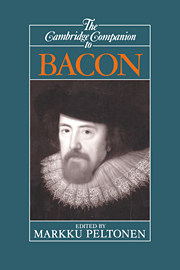Book contents
- Frontmatter
- Introduction
- 1 Bacon's idea of science
- 2 Bacon's classification of knowledge
- 3 Bacon's method of science
- 4 Bacon's forms and the maker's knowledge tradition
- 5 Bacon's speculative philosophy
- 6 Bacon as an advocate for cooperative scientific research
- 7 Bacon's science and religion
- 8 Bacon and rhetoric
- 9 Bacon and history
- 10 Bacon's moral philosophy
- 11 Bacon's political philosophy
- 12 Bacon's legacy
- Bibliography
- Index
5 - Bacon's speculative philosophy
Published online by Cambridge University Press: 28 May 2006
- Frontmatter
- Introduction
- 1 Bacon's idea of science
- 2 Bacon's classification of knowledge
- 3 Bacon's method of science
- 4 Bacon's forms and the maker's knowledge tradition
- 5 Bacon's speculative philosophy
- 6 Bacon as an advocate for cooperative scientific research
- 7 Bacon's science and religion
- 8 Bacon and rhetoric
- 9 Bacon and history
- 10 Bacon's moral philosophy
- 11 Bacon's political philosophy
- 12 Bacon's legacy
- Bibliography
- Index
Summary
Francis Bacon's natural philosophy may be viewed as a single philosophy with two aspects or as two philosophies each with its own peculiar character. Either way it is useful to acknowledge that there is a doubleness to his philosophical enterprise: on the one hand, Bacon's philosophy offers itself to us as a program for constructing a body of scientific knowledge that was supposed to yield immense practical benefits and so release the human race from material privation. On the other hand, it manifests itself as a rather strange corpus of speculative science. In its first guise Bacon's philosophy shows itself as a set of methodological recommendations together with a bold analysis of their implications for existing attitudes to knowledge and the institutions of knowledge.
- Type
- Chapter
- Information
- The Cambridge Companion to Bacon , pp. 121 - 145Publisher: Cambridge University PressPrint publication year: 1996
- 13
- Cited by

